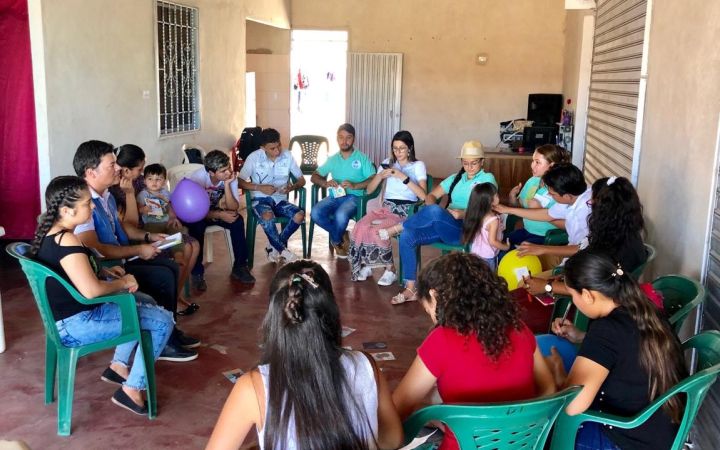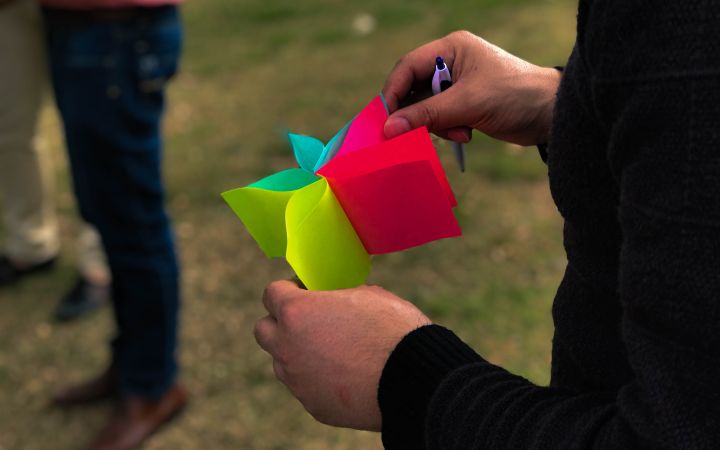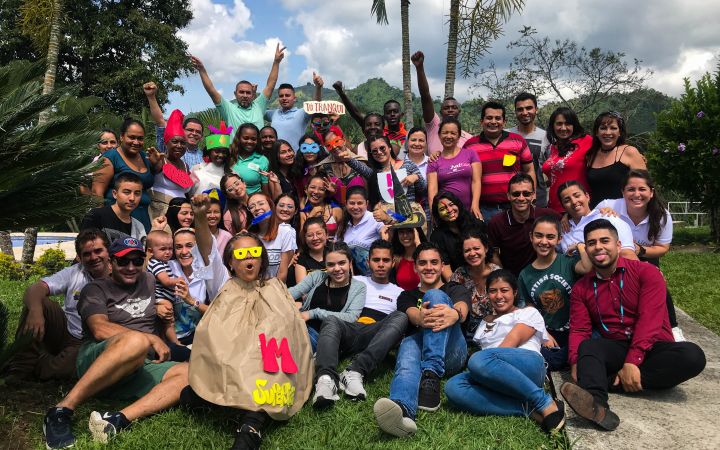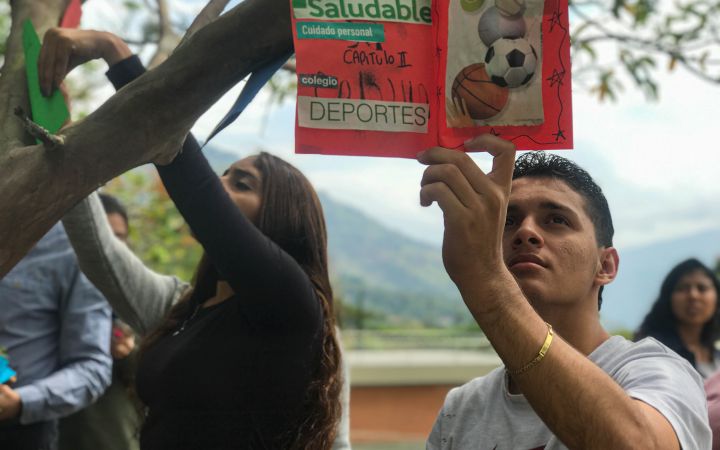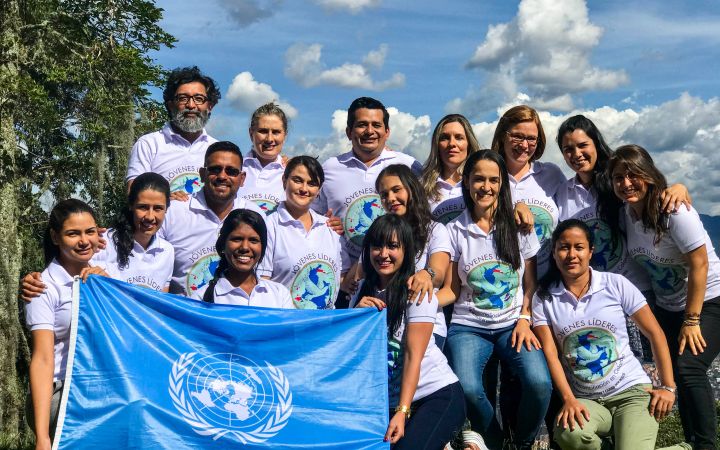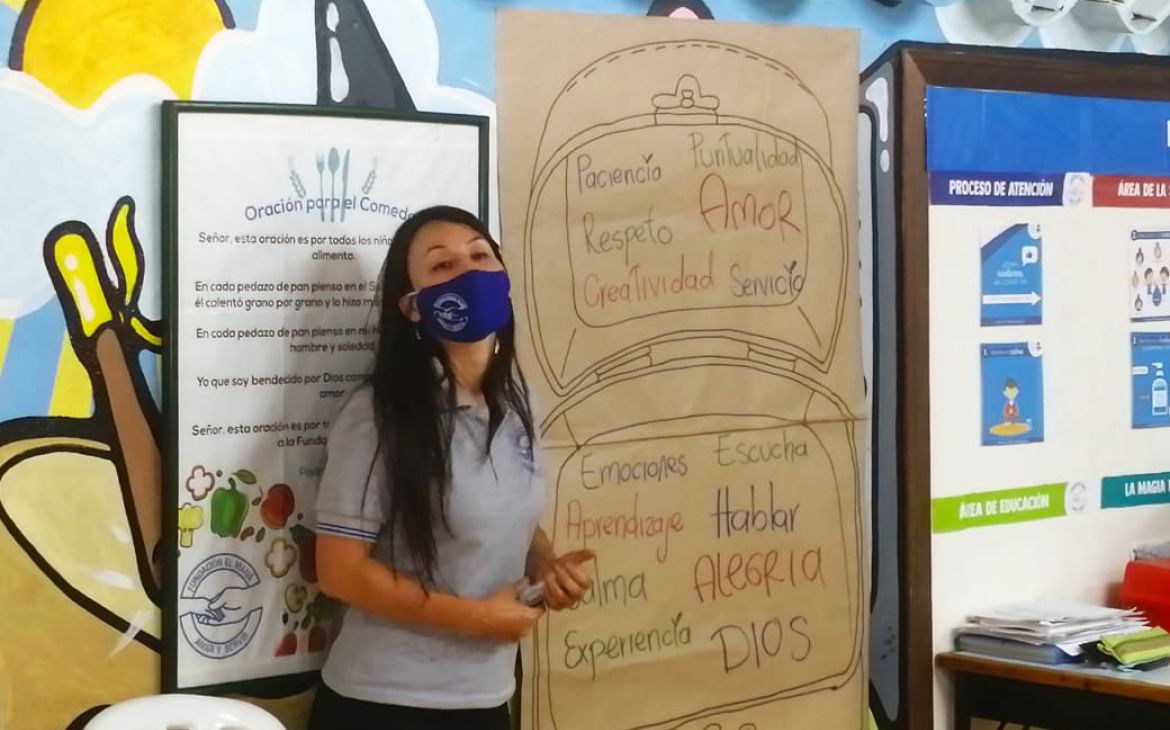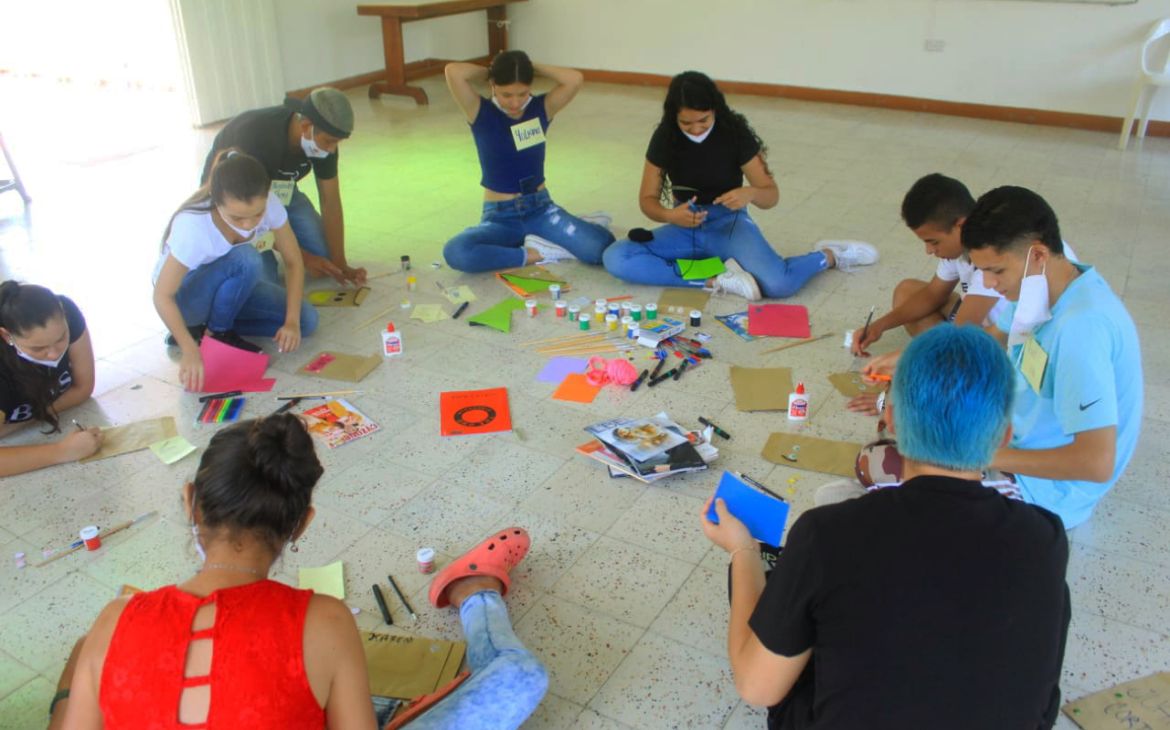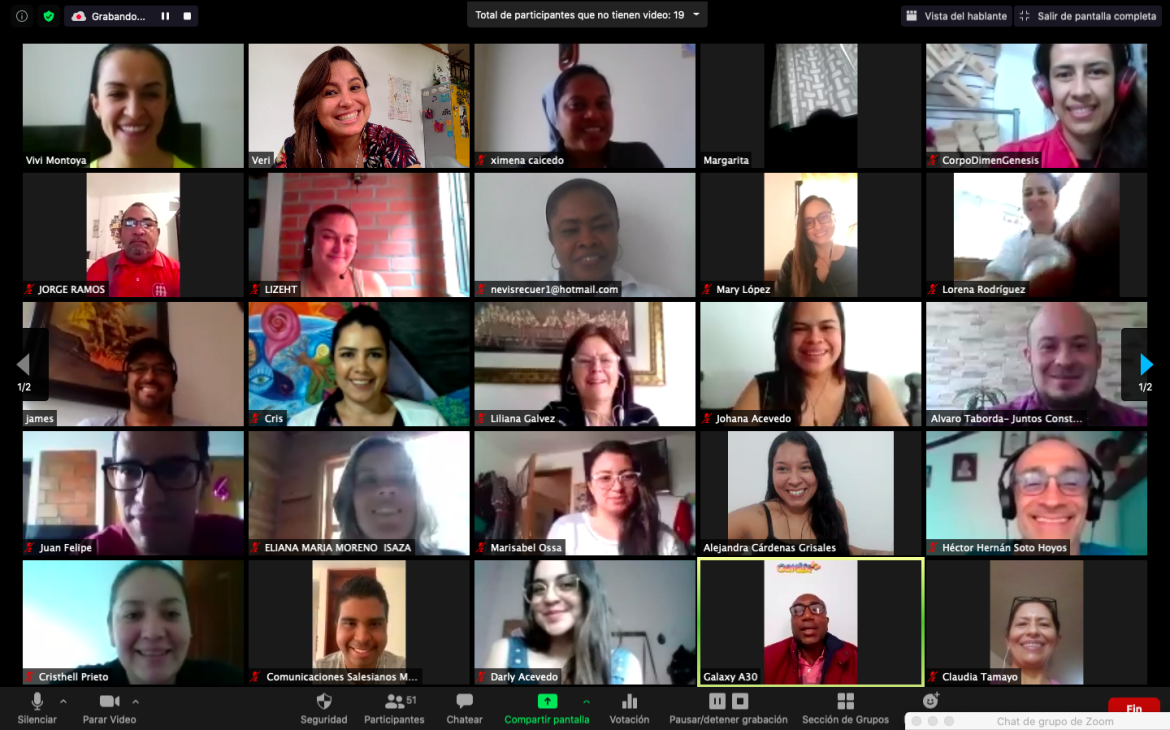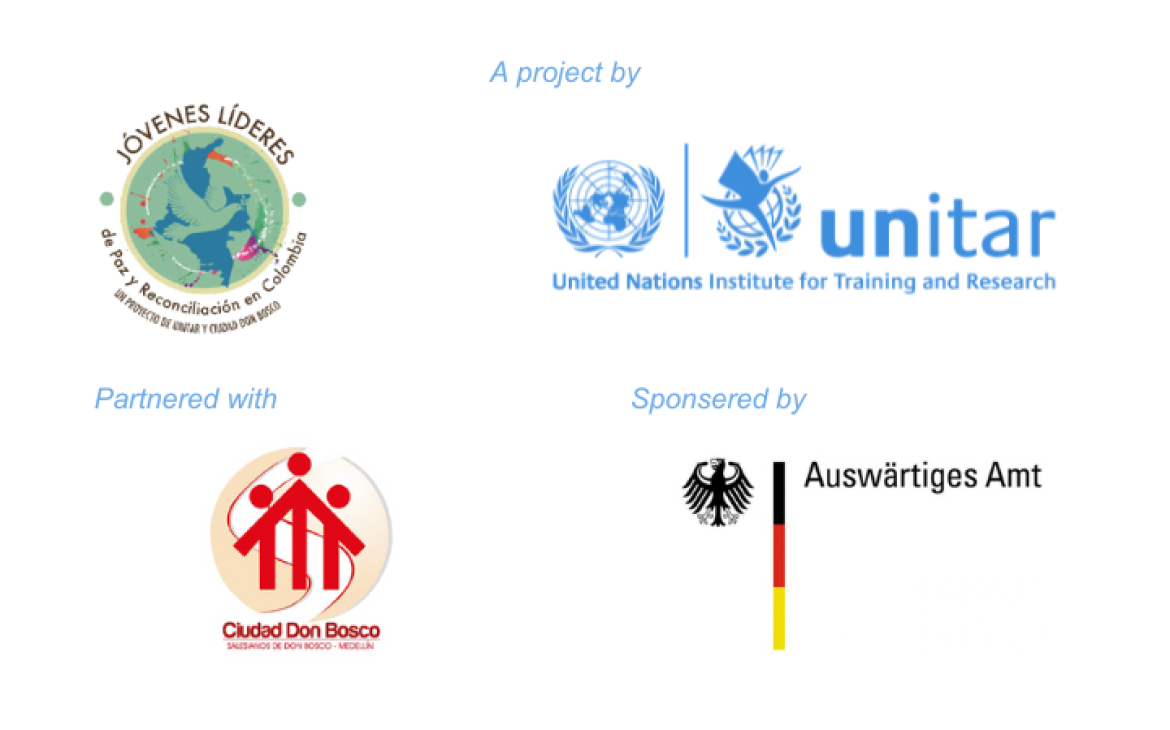“Youth-led Peace and Reconciliation in Colombia: A Transformational Approach” is a project designed by UNITAR with the generous support of the German Federal Foreign Office and in partnership with Ciudad Don Bosco (CDB). It aims to contribute to the ongoing peacebuilding and reconciliation process in Colombia by strengthening resilience and conflict prevention capacities of at-risk youth, families, marginalized communities and the broader society.
In the video at the bottom, the UNITAR team gives us an overview of the project and the justification for its implementation in Colombia. In addition, the communities share their testimonies after having lived the experience in each of the components.
Young people as leaders for peacebuilding and reconciliation?
For many people, the idea of young people leading a project aimed at building and restoring peace as well as reconciling a society impacted by more than 50 years of violent conflict may seem like an overly optimistic endeavour – a dream, that may not stand the test of reality. Indeed, young people in conflict-affected and fragile environments, including the Colombian post-conflict context, are often solely seen as victims of conflict, as troublemakers or spoilers. The partners behind this project – inspired by the United Nations Security Council Resolution 2250 - have taken on the challenge of proving that young people, when equipped with the necessary tools and connected to a network of inspiring youth and professionals, can act as the main drivers of peaceful change in their communities. What is more, by doing this work, we believe that young people do not only create a positive vision for their own future but inspire others to follow their example.
In light of this challenge, UNITAR, together with Ciudad Don Bosco (CDB) has developed a set of unique tools, aimed at supporting young people in conflict-affected communities in Colombia: (1) to overcome their past experience of conflict,(2) to recognize their potential to act as agents of positive and peaceful change in their immediate environments and (3) to contribute to ongoing reconciliation efforts. These tools build the basis for the three parallel and mutually reinforcing components of the project “Youth-led Peace and Reconciliation in Colombia – A Transformational Approach”.
A key aspect in the work of UNITAR and CDB in support of the Colombian peace process is the principle of approaching youth empowerment from a holistic perspective, designing the interventions to equip youth themselves, their families and communities as well as youth counterparts (educators, teachers, social workers, psychologists) with a wide range of instruments and tools. The following gives an overview of the three project components.
Component 1: Pintando el Futuro (Painting the Future)
Pintando el Futuro (Painting the Future) is the first component of the project and it focuses on preventing the (re-) recruitment of at-risk youth and support to the reintegration of former child soldiers through the use of comic books and other visual storytelling tools. A key aspect of this component is the inclusion of community level protection mechanisms as part of the methodology and the focus on countering stigmatization of young people - especially girls and young women, LGBTQ populations and indigenous community members - formerly associated with armed groups.
If you want to know the testimonials of the communities that lived Painting the Future, we invite you to access the following link, which will broaden your information and offer you the option to watch an interesting micro-documentary.
Component 2: Viaje de héroes y heroínas (The Superhero’s Journey).
The second component of the project is called: Viaje de héroes y heroínas (The Superhero’s Journey). It focuses on strengthening the capacity of young people in marginalized communities to act as agents of positive change in their direct environments. It does so by building on an agency-based empowerment approach – this means that in a playful way, young people are going on a journey of self-exploration and self-realization that allows them to explore their passions, values and strengths. The participants are then guided to develop initiatives and projects to the benefit of their community combining all these elements. The training methodology further supports local stakeholders in increasing their ability to implement activities at community level to better protect children and youth at risk. Hopefully. these ordinary superheroes, both youth and their counterparts, will slowly be changing the face of their communities.
If you want to know the testimonials of the communities that lived The Superheroe’s Journey, we invite you to access the following link, which will broaden your information and offer you the option to watch an interesting micro-documentary.
Component 3: Perspectivas de paz (Perspectives of Peace)
Perspectivas de paz (Perspectives of Peace) is the third component of the project, focusing on supporting the reconciliation process in the Colombian society through storytelling and historical memory building. Recognizing that about the narration of the past holds the power to define the future, the participants in component three are working to collectively build historical memory within their communities as a base to create new constructive and peaceful narratives. In doing so, the project builds on the use of community and family-based reconciliation, resilience and conflict transformation mechanisms. In addition, the intervention supports the promotion of youth as leaders in prompting do-no harm approaches and principles of non-discrimination and social inclusion. One of the main outcomes of this component is an interactive exhibition that show peace from the perspective of different communities from all over the country.
If you want to know the testimonials of the communities that lived Perspectives of Peace, we invite you to access the following link, which will broaden your information and offer you the option to watch an interesting micro-documentary.
What Makes This Project Special?
A key aspect of the project is its unique methodology as well as its inclusive character. The approach as well as all materials were developed jointly with the concerned community members, using design thinking approaches and gamification. All tools were first piloted and then further adjusted based on the feedback from the community and the professionals (educators, social workers, psychologists etc) that have been working in the community for many years. This approach allows for much greater local ownership and relevance, hence it encourages a more sustainable and long-lasting impact.
General Indicators and Geographical Reach of the Project
Since its initial implementation in 2019, the project expanded its territorial scope to reach 19 departments of Colombia, impacting numerous communities affected by the conflict and marginalized from society across the Colombian territory.
Between 2019 and 2020, all trained professionals from the 37 participating CSO’s implemented the three project components in their communities. In this dashboard you will find the general indicators of the project, the geographical scope, the strategy carried out during the COVID-19 pandemic and the monitoring and evaluation results after its implementation.
It is of great relevance to mention that even though the project formally closed in 2020, its sustainability has been so significant that in 2021 and 2022, the local organisations which led the implementation process continued to train youth from rural and urban communities in vulnerable areas of different municipalities in Colombia.
Project Timeline
The network of participating organisations for the Youth-Led Peace and Reconciliation in Colombia went beyond the implementation period of the project and continued activities in 2021, as shown below:
Project Activities Continued under COVID-19
The COVID-19 pandemic has a severe impact on the Colombian society with a continued lockdown in most departments of the country. Despite the near complete suspension of face-to-face trainings, the UNITAR project team, together with its main project partner Ciudad Don Bosco, as well as the network of implementing organizations, was able to continue project activities through the adaptation of working mechanisms to digital formats. The project team carried out five virtual Training of Trainers courses (ToT) for a total of 291 participants. Furthermore, seven virtual multiplication trainings for a total of 1479 participants were carried out by the previously trained Master Trainers. One in-person multiplication training with 30 participants has just started. In addition, the project team, in close collaboration with all the participating organizations, conducted a feasibility assessment for the continuation of project activities and the prospective achievement of project measures under the circumstances described as the “new normal”. As a result, it is expected that the project objectives will be fully achieved despite the ongoing pandemic, through the adaptation of delivery methods, catering to different levels of internet access and including several options for direct communication (Zoom, WhatsApp, podcasts and radio programming).
NEW METHODOLOGY: “DE REGRESO A CASA” (COVID-19 ADAPTATION)
Data already starts showing that the global COVID-19 pandemic exacerbates inequalities and has a negative impact on the safety of a significant number of children and youth in Colombia, which becomes visible through an increase in domestic violence as well as renewed dynamics of recruitment of children and youth by armed groups. In light of this challenge, this project plays a unique role in reinforcing efforts to protect and empower children and youth at all levels through truly inclusive programming and the creation of new opportunities for individual growth and community strengthening.
Therefore, based on a request for pedagogical material to support families, children and other vulnerable groups made by the project’s Master Trainers, the UNITAR project team developed a new methodology “De Regreso a Casa” (“Returning Home”). 30 Master Trainers participated in the initial workshop and 70 trainers have been trained in the use of the tool. The first multiplication included 250 students and the total expected reach is to 2500 children and youth. The activities can be conducted virtually as well as in an asynchronous way.
Voices of Painting the Future
In this video, we can learn, from Fabio Perez's perspective, about Painting the Future, the first component of our project "Youth-led Peace and Reconciliation in Colombia", which seeks to prevent the (re)recruitment of minors into organized illegal armed groups.
This video marks the launch of the new video series that aims to elevate the voices of diverse project beneficiaries. The series will focus on the various ways in which our participants are creating change and a peaceful future for they own communities. By sharing these peace perspectives from Colombia, UNITAR and partners hope to inspire others to follow their example and to become actors of change within their own context.
Newsletters
Below, you can read/download the project's newsletters. With them, we intend to keep all the different stakeholders that are fundamental to this project informed. To date, and with your help, we have been monitoring the progress of the project we built together - through surveys, interviews and other tools that are part of the process of Monitoring and Evaluation- and here are the results.
We plan to use these newsletters to share the impact of the project in different communities of our country as well as the work of professionals, educators and youth leaders who are making all this possible with their unrelenting efforts.


